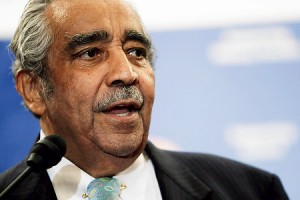(ThyBlackMan.com) When I first read the news about Representative (Rep.) Charlie Rangel filing a 2012 statement of candidacy with the Federal Elections Committee for a possible 22nd term in Congress, I initially laughed as I conjectured that the article was somehow meant as a joke. To my surprise, research indicated that the promulgation of Rep. Rangel’s filing was unequivocal and factual.
Just three months after being censured by the House and convicted of 11 charges by a House ethics panel for improper leasing, concealment of assets and other unethical practices, the thought that someone involved in such  crookedness could potentially win an impending election in 2012 was significantly problematic. It certainly leads one to contemplate a plethora of questions. For example, should term limits be established for members of Congress, as well as for Supreme Court justices? Additionally, is anti-corruption reform needed at the federal level? Relative to both questions, I would humbly answer, “Yes.”
crookedness could potentially win an impending election in 2012 was significantly problematic. It certainly leads one to contemplate a plethora of questions. For example, should term limits be established for members of Congress, as well as for Supreme Court justices? Additionally, is anti-corruption reform needed at the federal level? Relative to both questions, I would humbly answer, “Yes.”
Currently, members of the United States Senate can serve an unlimited number of 6-year terms, while representatives of the United States House are allotted an unlimited number of 2-year terms. And, Supreme Court justice appointments at the federal level are for life without any term limit restrictions. As articulated by statesmen such as Thomas Jefferson, George Mason and Richard Henry Lee and existing private organizations such as U.S. Term Limits, the idea of “perpetuity in office” has been and is extremely dangerous relative to American freedom and democracy.
Of course, there are certain commentators who believe that rotation in office for Congressional members and Supreme Court justices is somehow undemocratic and would create problems due to the absence of long-term incumbents. Thus, for these incumbency proponents, the fact that Rep. John Dingel has been in office for 55 years, Senator (Sen.) Daniel Inouye for 51 years, Rep. John Conyers for 46 years and Rep. Rangel for 40 years is not problematic. Or, the fact that Supreme Court justices have an average tenure of 25.5 years and oftentimes serve at ages where their capacity to be highly efficient and productive is significantly diminished.
Term limits are absolutely essential and necessary in changing how Congress and the Supreme Court presently work. With Congress, it is relatively safe to state that a plethora of incumbent members have reached a certain status where they are more concerned with reelection than the concerns of their constituency, relationships with special-interest lobbyists, micromanagement and their seniority.
With the Supreme Court, weathered justices logically become out of touch with the popular consent of the people. Additionally, there is an unbalanced approach to appointments, where certain presidents can appoint two or three justices while other presidents choose none. This often leads to politically-biased court rulings in lieu of unbiased decisions. On the whole, carefully-derived term limits for Congress and the Supreme Court would unquestionably require prudent exercising of authority and would result in more choices for voters and competitive elections, which could potentially preclude someone like Rep. Rangel from being re-elected even after being convicted of egregious ethics violations.
Anti-corruption reform is also imperative for a better Congress and a better democracy. To be sure, President Obama has stuck to his campaign promises of attempting to make the government more accountable by signing the Presidential Memorandum on Transparency and Open Government and tightening ethics to a certain degree via the Executive Order on Ethics Commitments by Executive Branch Personnel, which explicitly places bans on lobbyist gifts and revolving doors.
Unfortunately, as evidenced by Rep. Rangel and other members of Congress who have or are being investigated by the House ethics panel, corruption appears to be relatively rampant throughout both chambers. To be sure, perversion of integrity will always be present within the context of politics; however, this inevitable truth should not permit Congressional members to continue to serve after being found guilty of ethical infractions. Whether it is Rep. Rangel, Sen. David Vitter (soliciting prostitutes), Sen. John Ensign (affair with campaign staffer), Rep. Chris Lee (“The Craigslist’s Congressman”) and the list goes on, these public officials should no longer be able to serve in Congress.
Until such public corruption provisions and other tough laws and actions (i.e., tightening conflict of interest rules, earmark reform, stringent anti-bribery laws, etc.) are put into place, we will continue to see politicians like Rep. Rangel running for office even when objective evidence indicates that they struggle with honesty and integrity.
Written By Anthony Jerrod
Official website; http://www.anthonyjerrod.com/

















Leave a Reply